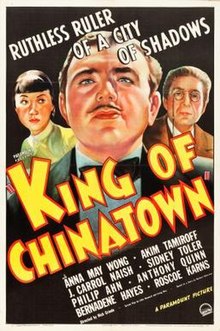| King of Chinatown | |
|---|---|
 Theatrical release poster | |
| Directed by | Nick Grinde |
| Screenplay by | Lillie Hayward Irving Reis |
| Story by | Herbert Biberman |
| Produced by | Harold Hurley |
| Starring | Anna May Wong Akim Tamiroff J. Carrol Naish Sidney Toler Philip Ahn Anthony Quinn Bernadene Hayes |
| Cinematography | Leo Tover |
| Edited by | Eda Warren |
| Music by | Gerard Carbonara John Leipold |
Production company | |
| Distributed by | Paramount Pictures |
Release date |
|
Running time | 57 minutes |
| Country | United States |
| Language | English |
King of Chinatown is a 1939 American crime film directed by Nick Grinde and written by Lillie Hayward and Irving Reis. The film stars Anna May Wong, Akim Tamiroff, J. Carrol Naish, Sidney Toler, Philip Ahn, Anthony Quinn and Bernadene Hayes. The film was released on March 17, 1939, by Paramount Pictures. [1] [2]